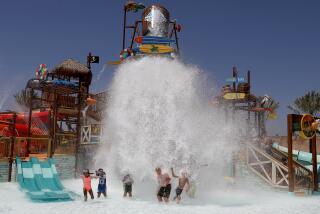Emotional Plea Made for Amusement Park Rules
OAKLAND â The mother of a teenager who died in a collapsed water slide accused state officials Monday of moving too slowly on stringent new regulations for the amusement park industry.
âTwo and a half years have gone by and we are still fighting for this,â Victoria Nelson of Napa said at a state hearing on the regulations.
âI donât understand it. How many injuries does it take? How many deaths does it take? . . . I hope maybe some of you in this room think and feel how it might be for you to go home and not find the most important person in your life there.â
Nelsonâs 18-year-old daughter, Quimby Ghilotti, died in June 1997 when a water slide collapsed at Waterworld USA in Concord.
Nelson spoke at a hearing in which the final language and details for the first set of regulations of a new amusement park law were being decided.
She urged industry officials to do what she believes is the right thing: Stick to the broadest possible wording in requiring amusement parks to report injuries to the state Division of Occupational Safety and Health, the agency responsible for enforcing the law.
She looked directly at the industry representatives, who were seated apart from the mothers and consumer advocates, and told them to think about their own families when they fight more restrictive state oversight.
âWe get caught up in all the language of the law and we forget that it is about this,â said Nelson, holding her hand over her heart.
âIs it less important because it isnât your family?â
Injury reporting is one of the key and controversial aspects of the law, written by Assemblyman Tom Torlakson (D-Antioch). The new law also requires annual ride inspections by the state and an independent contractor.
Gov. Gray Davis signed the legislation last year, but it has been largely unenforceable because the regulations have not been adopted.
Under the draft regulations, parks would be required to report injuries beyond ordinary first aid. The draft language also includes a list of injuries to be reported such as loss of consciousness, bone fracture and permanent disfigurement.
Consumer advocates argue that the list is inadequate and would give amusement parks an excuse not to report other injuries.
âIf California allows the park industry to set arbitrary limits on injury reporting, our understanding of the problem and our ability to solve it will be limited as well,â said Kathy Fackler of La Jolla. Facklerâs son was injured in 1998 on a Disneyland roller coaster, Big Thunder Mountain Railroad.
Torlakson also appeared at Mondayâs hearing, advocating broad reporting of injuries so consumers will have comprehensive safety data.
âI am convinced every part of this bill will make a difference and reduce accidents,â Torlakson said.
He first pushed the legislation after Nelsonâs daughter died. That bill failed.
He tried again after a fatal Christmas Eve accident in 1998 at Disneyland. In that accident, a Washington tourist was struck by a metal cleat that tore off the sailing ship Columbia. His wife and a Disneyland employee were seriously injured.
It is rare for the author of a bill to take the time to attend a hearing after the bill has passed, said Len Welsh, special counsel for the Division of Occupational Safety and Health. And he said it is helpful for regulators to know what Torlaksonâs intent was.
Only a couple of the representatives from the amusement park industry spoke during the hearing. But in written comments, amusement parks generally supported the proposed language.
Attorney Boyd Jensen, who often argues for theme parks, said: âIt is important that we remove the politics and headline-grabbing language.â The most important aspect of injury reporting, Boyd said, is that it be measurable.
Jensen and others also commented on the stateâs proposal that licensed engineers be allowed to inspect rides. Both industry representatives and consumer advocates agreed that the engineers must be trained to examine amusement park attractions.
Disneyland spokesmen had said the park would send written comments as well, but they had not been received by Monday afternoon.
Injury reporting was the key area of disagreement, and the issue that prompted Nelson to make her plea.
âIt is important to me that this law is honored in its true intent, thus preventing another mother from experiencing this loss,â Nelson said.
Hearing officials said all of the public comment will be considered. If they rewrite the regulations, they will allow 15 days for public comment.
It probably will be February before the final regulations are adopted. The safety division also is working on two more sets of regulations which must be completed before the law can be fully enacted.
Additional inspectors also are being hired. They will be responsible for inspections of rides annually, after accidents and when a ride is opened or changed.
âWeâre building a whole new unit from the ground up,â Welsh said.
More to Read
Sign up for Essential California
The most important California stories and recommendations in your inbox every morning.
You may occasionally receive promotional content from the Los Angeles Times.











